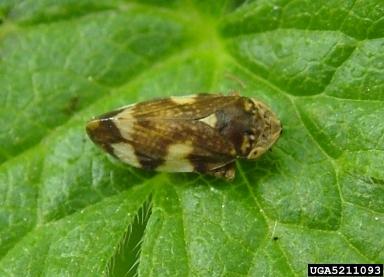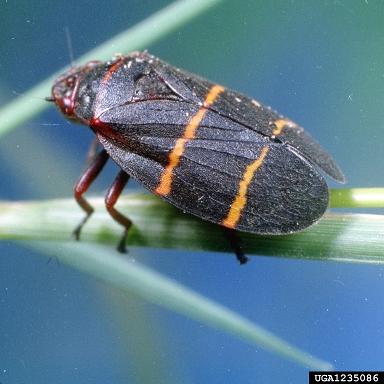Biology
Spittlebugs are an occasional pest of strawberries in North Carolina. Meadow spittlebugs (Philaenus spumarius) and two lined spittlebugs (Prosapia bicincta) are among the species found in North Carolina. Meadow spittlebugs feed on over 400 host plants, including cultivated grains, legumes and strawberries. Overwintered eggs hatch in the spring.
Both nymphs and adults feed by sucking plant juices out of their host plants with their straw-like mouthparts. In the fall, adult females lay eggs at the base of strawberry and other host plants.
Another spittlebug, the twolined spittlebug is occasionally found feeding on small fruits, including strawberries, in North Carolina. Its life cycle and feeding behavior is similar to the meadow spittlebug, but it has two generations per year.
Damage
The mass of “spittle” surrounding the spittlebug nymphs are sometimes considered distasteful by patrons of pick-your-own operations. However, this damage is only cosmetic and usually does not warrant treatment.
Management
Cultural
Strawberries grown as annuals, which is the common method in North Carolina, are less likely to become infested with spittlebugs than in perennial matted-row cultures. Spittlebugs can be easily washed off plants with water.
Conventional Insecticides
Although damaging infestations are rare in North Carolina, several foliar applied insecticides are available for use against spittlebugs. Refer to the North Carolina Agricultural Chemicals Manual for materials recommended for use against spittlebugs in North Carolina and the Southern Region Small Fruit Consortium Strawberry IPM Guide for regional recommendations. Treatments should not be applied when bees are actively foraging.
For More Information
North Carolina Agricultural Chemicals Manual
Strawberry IPM Guide - Southern Region Small Fruit Consortium
Meadow Spittlebug - Cornell Cooperative Extension
Managing the Twolined Spittlebug in the Home Landscape - NC State Turf and Ornamental Notes
Publication date: May 13, 2014
N.C. Cooperative Extension prohibits discrimination and harassment regardless of age, color, disability, family and marital status, gender identity, national origin, political beliefs, race, religion, sex (including pregnancy), sexual orientation and veteran status.



